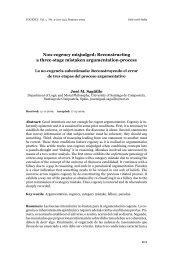Cogency v2 n2
Cogency v2 n2
Cogency v2 n2
Create successful ePaper yourself
Turn your PDF publications into a flip-book with our unique Google optimized e-Paper software.
COGENCY Vol. 2, N0. 2, Spring 2010<br />
The assertion that it is either raining or not, tells us nothing about the<br />
weather. However, tautologies are not nonsensical (unsinnig) because they<br />
show us the logic of the world. They make manifest what cannot be said<br />
about logical form and the pictorial relation (4.461-4.462, 6.12).<br />
Our thesis with respect to the Tractarian view of specifically philosophical<br />
argumentation is that nothing can be said about it (in the technical sense<br />
of saying). First, there is nothing to argue about. There are no genuine philosophical<br />
propositions, so there is no subject matter for philosophy. Second,<br />
even if there were something for philosophers to argue about, the “correct<br />
method” in philosophy would not include arguing about it. Finally, even if<br />
there were a subject matter to philosophy and a role for arguments in philosophy,<br />
there would still be nothing philosophical that could be said about<br />
the general nature of arguments.<br />
The claim that philosophy does not result in philosophical propositions<br />
(4.112) is an immediate consequence of the picture theory of meaning and<br />
the contrastive accounts of science and philosophy. Propositions are symbols<br />
with sense (3.3), propositions are true or false (4.1, 4.123), the totality<br />
of true propositions is the whole of natural science (4.11), but philosophy is<br />
not a science (4.111). Philosophy, therefore, does not traffic in truths. Consequently,<br />
the only subjects left for possible philosophical scrutiny would<br />
be those about which there are no genuine propositions: philosophy would<br />
be the discourse of ineffable subjects. However, in contrast to those alleged<br />
beetles sealed inside Investigations’ boxes, an ineffable subject may indeed<br />
be better than no subject at all, at least for interpretive, explanatory purposes,<br />
if not for factual, scientific purposes. Since the ineffable includes ethics,<br />
metaphysics, logic, and other important and traditional areas of philosophy,<br />
what has to change is what philosophers do with their subject. The<br />
goal can no longer be the production or discovery of truths, so it has to involve<br />
something else. What Wittgenstein offers us instead is making things<br />
clear: clarifications (4.112) and elucidations (6.54).<br />
The second part of the thesis concerns the “correct method” in philosophy.<br />
Wittgenstein tells us at 6.53 that this would involve nothing more that<br />
the simple assertions of scientific (non-philosophical) truths about the world<br />
in order to disabuse others of their tendencies towards meaningless metaphysical<br />
pseudo-propositions. Engaging them in argument about metaphysics<br />
is precisely what must be avoided because it would only serve to rein-<br />
24








